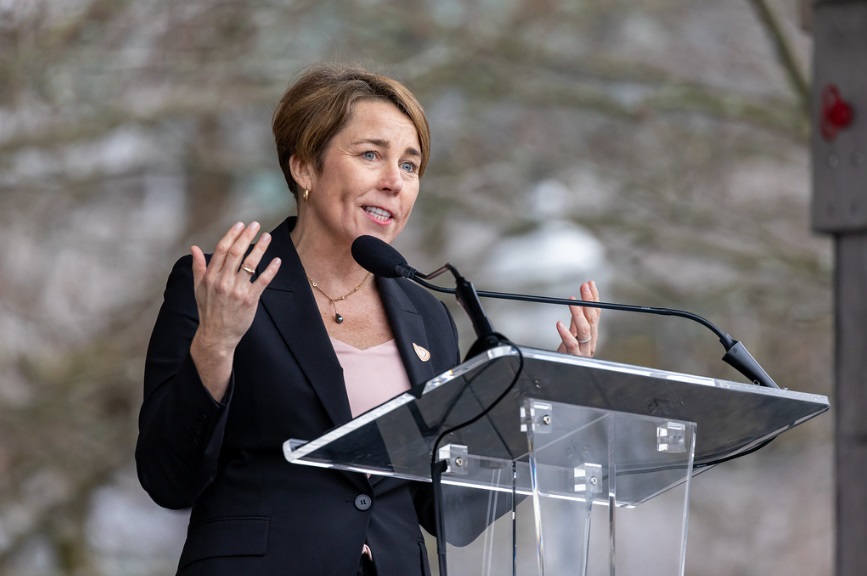latest
Governor Healey’s free college cost pegged to aid, enrollment projections

By Sam Drysdale
STATE HOUSE, BOSTON, APRIL 6, 2023…..Gov. Maura Healey said this week that she is looking forward to working with the Legislature on ways to fund free community college for Massachusetts residents over 25, after a representative questioned if the $20 million she earmarked for the program would be enough.
Rep. Natalie Higgins of Leominster said at a budget hearing last month that if all estimated 700,000 state residents who have taken some college classes, but don’t have a degree, enrolled in the program that it would only come out to $28 per head in aid. And Speaker of the House Ron Mariano indicated last week that the House may increase the price tag for the community college measure above $20 million in their version of the budget that will be released sometime in the coming weeks.
There are 15 community colleges in Massachusetts, that serve over 150,000 students. The system accounts for 49 percent of undergraduate credit enrollments and represents 42 percent of the total students in the public higher education system. These colleges also educate the largest share of students of color, and serve the highest percentage of low-income students in public higher education, according to the Massachusetts Association of Community Colleges.
In response to questions on if the $20 million will be enough to cover costs related to tuition, fees, books and supplies for all eligible residents over 25, the Healey administration has said that so-called “MassReconnect” is a last-dollar guarantee program, so students will not be left without coverage.
Students who want to enroll in the program will first complete Free Application for Federal Student Aid (FAFSA) forms to see what aid they qualify for from the federal government. MassReconnect will fill in costs not covered by federal aid, other state aid, and institutional aid such as MASSGrant and MASSGrant Plus.
Since the program will be open for any resident over 25 without a college degree, students will have a range of financial needs, a Healey official said. While some may only need $5 per month after scholarships and need-based aid, others may need $1,000 per month from MassReconnect, or more.
The $20 million estimate is designed to cover otherwise unmet costs for currently enrolled 25-plus students, including both those who have and those who have not yet filled out their FAFSA forms, and Massachusetts residents over 25 who will enroll in community college for this upcoming year and complete the financial aid form, according to the Executive Office of Education.
The administration came to their recommended $20 million for the pilot program with an anticipated 6,500 to 8,000 students using MassReconnect to round out their community college payments in fiscal year 2024.
They believe that number will rise as more people hear about the program, and are anticipating close to 10,000 students by fiscal year 2025.
Current Department of Higher Education data indicates about 14,500 community college students who are 25 years and older and enrolled in six or more college credits have completed a FAFSA form. Of these students, about 9,700 are currently fully supported for tuition, fees, books and supplies by federal, state and institutional aid. The 4,600 students remaining would be eligible for MassReconnect under the governor’s plan.
There are an estimated 7,700 community college students over 25 who, once they complete their FAFSA, would have unmet need covered by the program.
The projected state cost for MassReconnect will likely change in future years depending on how well-known the program becomes, which may encourage students who would not have otherwise attended community college to go back to school knowing all of their costs will be covered.
“I look forward to working with the Legislature on ways to fund community college education. We put forward a plan through MassReconnect that we think is really terrific because it’s going to enable people who’ve left education, who are out there, to come back to community college, quickly get training and education that will help get them into the workforce,” Healey said on Monday. “I think it will make a meaningful difference in people’s lives. So I look forward to more conversations with the Legislature about what we can do to make that kind of education for a workforce available to as many people as possible as quickly as possible.”
The House will put forward its version of the budget in mid-April, which may include the over-$20 million line item that Mariano alluded to when he said he did not think the governor’s recommended $20 million would be enough.
“I think it’s more,” he said. “We’re still debating that, trying to get numbers, but I think it’s more.”
On the Senate side, Senate President Karen Spilka has promised that her chamber will pursue a plan to make community college free for all, including those under 25.






J. Cardoza
April 7, 2023 at 7:59 am
I didn’t see the term LEGAL RESIDENTS anywhere in the article. Why ?